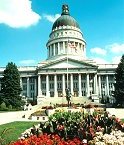PROVO -- When Italian religious scholar Massimo Introvigne announced a break in the opening session of an international conference of religious scholars at LDS Church-owned Brigham Young University on Friday, he lightheartedly educated participants on a particular aspect of Mormon faith.
"We will now have a coffee break, which will be a non-coffee break, this being BYU," said Introvigne, director of the Center for Studies on New Religions, which is holding its 15th annual gathering at BYU and the University of Utah this weekend.
The acknowledgment of The Church of Jesus Christ of Latter-day Saints' prohibition on caffeine perhaps should have included a reminder that Mormons also shun tobacco, because as soon as the break began, a group of European participants nonchalantly puffed cigarettes outside the BYU law school building between sips of lemonade and water.
Just part of the sometimes awkward learning curve for global researchers of new religious movements, who heard various takes on Mormonism's evolution from outcast to mainstream on the opening day of a multi-disciplinary examination of the diversity of secular and religious institutions.
"In Utah, you call [Mormonism] a church but in many other countries it is seen as a sect," said Eileen Barker of the London School of Economics to the approximately 150 participants. "It started off as a sect but moved to a denomination."
Jan Shipps, the noted academic researcher of Mormonism, argued that the LDS Church began as a "cultic, rather than sectarian movement."
"Sects grow up to be denominations, cults grow up to be new religious traditions," said Shipps, author of Mormonism: The Story of a New Religious Tradition.
Although Mormonism was founded at a time when federal protections of religious freedom were well-established, the very nature of LDS beliefs and the Saints' unwavering obedience to a living prophet made them targets of persecution along the path of their exodus to Utah, said Richard Bushman of New York's Columbia University.
"They were like black Americans 50 years ago, trying to purchase a house in a white suburb; they were not welcome," said Bushman.
In some parts of the world, many of those same apprehensions toward Mormonism thrive today, other researchers said. Bernadette Rigal-Cellard of the Universitè Michel de Montaigne-Bordeaux surveyed French members of the LDS Church to ask how they relate to a church with so many American qualities when the French people have a predisposed distaste for American culture.
"A majority of the respondents were not bothered at all by the special place America held in God's design in Mormonism," she said. "Most French LDS refuse to be seen as belonging to an American church and they still have the same love-hate relationship with America as do other French."
Still, Rigal-Cellard said the 50 or so French members of the LDS Church she surveyed -- she estimated there are 30,000 Mormons in France, "far lower than most western European countries" -- noted distinctly American cultural identity markers to their faith. Those markers ranged from cookies and free English lessons offered by Mormon missionaries to the "very un-French" tendencies of super-patriotism and public testimony of religious beliefs.
As the numbers of non-American converts to Mormonism continue to eclipse U.S. converts, Rigal-Cellard said French Mormons believe the "Made In the U.S.A." label of Mormonism will fade.
"One French LDS missionary told me the myth of the Mormons as an American church will soon be forgotten because the Mormon Church will be no more American than the Catholic Church is Roman," she said. "I thought that a bit short-sighted since, while we in France call it just the Catholic Church, everywhere else it is still known as the Roman Catholic Church."

